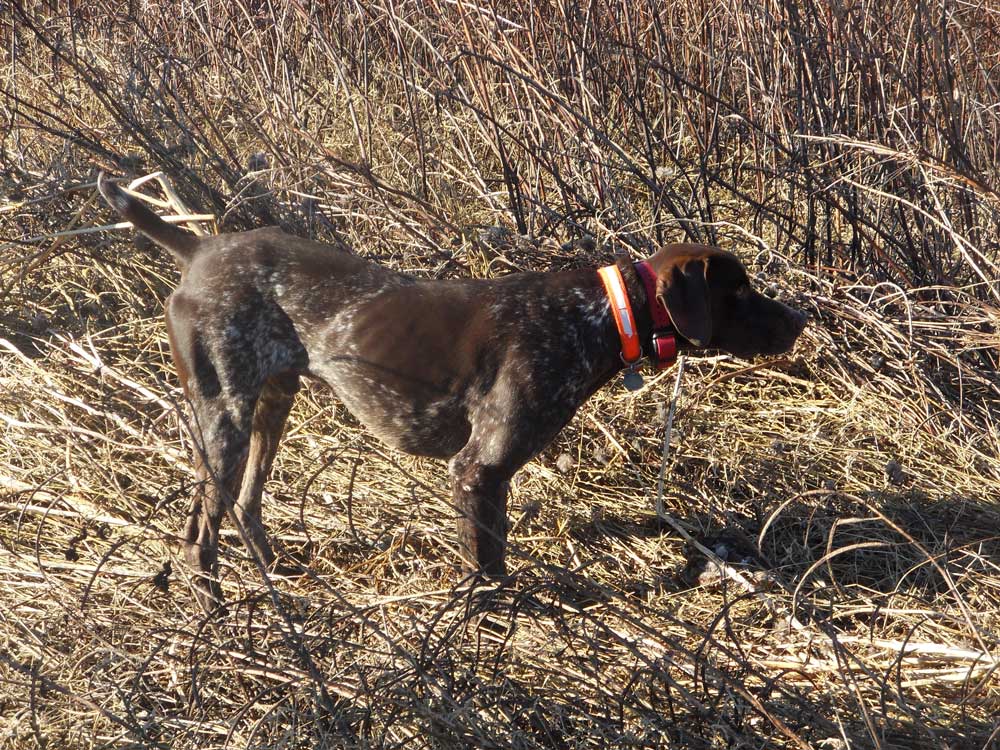What is my Dogs Primary Purpose?
In training a novice pointer, we are training obedience rather than how to hunt.
Every spring finds most of us bird dog owners asking ourselves, “What do I do next?”
We are consumed by thoughts of training our upland bird dogs. A great amount of joy can certainly be obtained from training our own gun dog, but it can also be extremely frustrating if we are uncertain of proper training techniques.

Bird Dog Training
Pro trainers can oftentimes get accelerated results in even the toughest lessons. We must consider three main questions when trying to decide whether to train our own dog or call a trainer:
1) What exactly do I expect to achieve, and what do I want out of my dog?
2) How much time do I have available?
3) What is my training skill level?
When answering these questions, we must take into consideration what will be the primary purpose of the dog. For instance, an average hunting dog that hunts 15 to 20 days a season will take less preparation than a bragging rights field trailer.
We must also think of when we want to begin hunting with our new puppy. If a new puppy is the primary pupil, then we cannot expect a finished dog going into the first season. The bragging rights type of bird dog will require quite a few more lessons that a pro trainer can deliver.
For instance, “force fetch” and “steady to wing and shot.” Both lessons can be taught by a novice but may deliver varying results. Once we decide on what the expectations are for our dog, then we must think of time restraints in our daily schedules. Some lessons simply take a significant amount of time.
“If possible, the puppy will need to be worked every day to improve his potential for his first hunting season.”
When asking ourselves the question, how much time do I have available, we must keep in mind that for best results for our puppies we will need to work them a minimum of 15 to 30 minutes a session per day. Two or three sessions per day will greatly improve our dog’s skills better than once a day.
If possible, the puppy will need to be worked every day to improve his potential for his first hunting season. The puppy’s first season will be one of many unproductive points, but even the occasional rabbit or mouse being pointed is positive. It’s a sign of improvement.
A safe timeline for a new puppy would leave the beginner peaking around midseason of the second season. Most field trailers that I know will not even begin to pressure a dog until it is one year old or older. At this point, it’s worth mentioning that when discussing time, the average trial dog will spend three to four times more time in training than the average hunter. The trial dog will see hundreds or even thousands of more repetitions in the training sessions than the average hunting dog.
When evaluating our skill levels, the biggest question to ask ourselves is how much patience do we have? If we are new to bird hunting and have never had a bird dog before, then it would be worthwhile to seek advice from a professional trainer in the area. If we are a person who is detail-oriented and has spent much time in the bird fields, then training a new dog should not be difficult at all.

Once again, even some experience teaching a young puppy can push our patience to the ultimate extent. When training a pointing dog or puppy, we are only teaching obedience and not teaching the dog how to hunt. All bird dogs with a good bloodline already know how to hunt, that’s a trait that is passed down from its ancestors.
“If lessons are kept short and positive, both the dog and you will enjoy the lessons much more.”
There will be some sessions that puzzle the novice trainer but can be overcome if the trainer realizes that help is needed and seek professional advice. A trainer must be very careful and control all scenarios to our greatest potential. If a novice trainer pays attention to detail and reads the dog’s body language, then the lessons will be accelerated.
If lessons are kept short and positive, both the dog and you will enjoy the lessons much more. In conclusion, when deciding to train or not to train, we must evaluate ourselves first, and then the dog. A novice trainer should ask oneself: What do I expect, how much time do I have, and what experience do I have as a trainer?
(Ben Busby is part owner of a full-service upland hunting preserve and a member of Sportdog Brand’s Upland Field Staff. Ben Busby has trained sporting dogs actively for five years)



